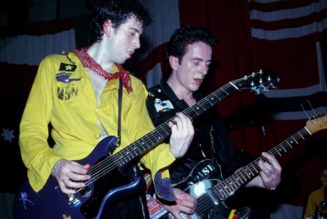In the cutting-edge world of NFTs there’s almost no greater compliment than to call a piece “timeless.”
In their perennial pursuit of value and utility, NFT creators and collectors alike constantly question what combination of creative and immutable qualities have the ability to leave a lasting impact. Given the feverish mainstream interest in the space, most NFT (non-fungible token) projects have borne little meaning beneath their superficial qualities.
However, every once in awhile, a project with the organic confluence of superior design, noble intention, and historical relevance comes along.
The rise in popularity of digital collectibles immediately grabbed Aloe Blacc‘s attention, and soon the Grammy-nominated artist became consumed with an idea that had the potential to create tangible social change. With a spotlight shining bright on the NFT space, Blacc became intent on seizing the moment while honoring the life and legacy of his late friend and collaborator, Avicii.
Blacc got the ball rolling by reaching out to Avicii’s father, Klas Bergling, as well as the legendary dance music producer’s record label. The idea was to create an NFT that had the potential to spread awareness of mental health-related issues and support the mission of the Tim Bergling Foundation. While all parties were on board with the idea in principle, it would take the right timing, talent, and execution to ultimately bring the concept to fruition.
Eventually Blacc stumbled on the key to bringing his idea to life. It started on Clubhouse, a social media platform that has emerged as an incubator of disruptive NFT and crypto conversations. By a stroke of luck Blacc and designer Alex Alpert wound up in a Clubhouse room discussing the topic, and they quickly connected.
“When Aloe reached out to me and talked about a possible collaboration I was very excited by the prospect of doing a tribute to Avicii, somebody who I respect so much as an artist,” Alpert told EDM.com. “I also saw it as an opportunity to use the NFT space to promote awareness of mental health and try to destigmatize it, which is something I’m passionate about.”
As the world of NFTs becomes more and more saturated, collectors have been on an elusive quest for something fresh. Blacc and Alpert’s “Wake Me Up” tribute piece has the one-of-a-kind allure of a collectible that would instill confidence in its owner that they possess a piece of dance music history. Seemingly every time you look at it, you’re bound to notice something new—just like Avicii each time he saw a piano and created an ageless melody.

Through conversations with Aloe Blacc, digital artist Alex Alpert turned the singer’s memories into visuals, bringing the inspirations behind “Wake Me Up” to life.
Alex Alpert
The canvases are busy by design, as if to illuminate the scenes of a crowded mind. Blacc and Alpert revealed that is no mere coincidence. Through his conversations with Blacc, Alpert came to understand what he was visualizing when writing “Wake Me Up” all those years ago. With Blacc’s articulation in mind—and using the generational dance anthem as a sonic backdrop—Alex got to work materializing those secondhand memories in a stream of consciousness-style exercise.
“For me, ‘Wake Me Up’ is a song of nostalgia. Thinking back to the days of my adolescence, being carefree, taking risks, having fun,” Blacc explained. “It’s also a song of hope—hope for the future. It’s about wanting to make new memories, do amazing things, and achieve my goals.”
The significance of this particular NFT collection goes a layer deeper, however. The pièce de résistance of the art lies in its perceived connection to Avicii. Whoever is lucky enough to take home the unique collectibles, Blacc says, will effectively carry on Avicii’s legacy.
“I think if [Avicii] was around he certainly would have been one of the first music artists to engage in the world of NFTs, Blacc said. “As a proxy or representative of his legacy—because of the music we’ve made—I want his legacy to be a part of it.”
“I want him to become part of the world of NFTs because I know that it’s going to be the future and I feel like Tim was part of defining the future,” he continued.” “He defined dance music for an entire generation of people. I can’t see the future moving forward without allowing Tim’s legacy to touch each part of what’s happening.”
Avicii has been gone for three years now, though that sobering fact is still somewhat hard to believe given the lasting impact of his music. “Wake Me Up” stands out as one of his most profound works, continuing to touch music fans from all walks of life. Looking back, it’s all quite impressive, especially given the fact that the song—which debuted at Ultra Music Festival back in 2013—wasn’t exactly warmly received at first.
Audiences were befuddled by Avicii’s perceived departure from progressive house music and were skeptical about whether incorporating bluegrass influences into his debut album was such a great idea. Nonetheless, Avicii responded by standing by his art. “We wanted to make a statement, and theres really no better place to make one than UMF mainstage,” Avicii said at the time. “People will soon see what it’s all about.”
History would look back favorably on Avicii’s decision to follow his heart. In 2014 “Wake Me Up” became the most streamed song on Spotify of all-time and was the first to ever eclipse 200 million streams on the platform. Today it continues to stand the test of time, having generated 1.3 billion streams and counting, effectively making it one of the world’s most valuable musical works.
Regarding the song’s journey to such great heights, Blacc says it’s been a surprise every step of the way. “I had no idea where it was going to go,” he admitted. “I think Tim had no idea where it was going to go. He just knew he did not want to go back to what he had done before. That’s the most important aspect, and it proves positive because the world was ready to move forward.”
The official “Wake Me Up” tribute collection was sold on OpenSea. Proceeds from the NFT will be donated to the Tim Bergling Foundation.
FOLLOW ALOE BLACC:
Facebook: facebook.com/aloeblacc
Twitter: twitter.com/aloeblacc
Instagram: instagram.com/aloeblacc
Spotify: spoti.fi/37DmFMz



![Which Producer Should NGHTMRE Collab With On His Debut Album? [POLL]](https://www.wazupnaija.com/wp-content/uploads/2020/06/which-producer-should-nghtmre-collab-with-on-his-debut-album-poll-327x219.jpg)






